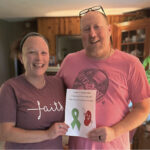
Julie McKelvey climbing Lobuche Peak in Nepal
Fewer than 100 women have climbed the Seven Summits, the highest peaks in each of the seven continents. Julie McKelvey, of Lemoyne, is attempting to count herself among this elite group.
McKelvey, who described herself as “not a super-athletic kid,” began climbing at the invitation of her father, a long-time extreme sports enthusiast.
“He said, ‘I think I have one more in me, I want you to do it with me,’” said McKelvey, recalling that day in 2016.
So, she and her son, Jacob, then 12 years old, traveled to Japan to climb the 12,388-foot Mount Fuji.
Even though they trained little, and had the wrong gear, and the “wrong everything,” the trip was her gateway into more climbing.
“So, we go outside, and I see the sunrise above the clouds for the first time with Jacob, and I fell apart,” McKelvey said. “I had this spiritual experience around it. I was like, ‘I’m totally disconnected from all the other crazy pieces of my life and totally present in the moment.’”
Wanting to share this mountaintop experience, she convinced some friends to climb Mount Kilimanjaro with her. They had a great experience on the Tanzanian peak, though her friends were “once and done,” said McKelvey.
Then one of her guides asked if she had thought about climbing The Seven Summits. McKelvey thought, “The what?”
She researched and connected with a company that specialized in helping adventurers climb these formidable peaks, then headed to Mount Elbrus in Russia.
“That was really the trip that changed everything,” McKelvey said.
Huge Sacrifice
Such a commitment to climbing takes time.
McKelvey trains six days a week, 25 to 30 hours total. This includes the drive time to peaks like Hawk Mountain, about an hour northeast of Harrisburg, pack prep, stretching before and after, and trekking multiple times up and down the mountain with a 60-pound pack. Closer to home, there’s strength training in Dillsburg with Kevin Keefer Personal Training.
The hardest part?
“It’s the mental pace to have to keep going at this pace with the training,” said McKelvey. “There are just days when I don’t want to do it.”
Part of the mental challenge is leaving behind her husband Bobby and sons, Jacob and Jackson.
“It’s a huge sacrifice for them,” she said. “I am away a lot, and they worry about me, as they should.”
Part of that worry comes from her experience of altitude sickness on Aconcagua in South America.
Hit with blurred vision and dizziness, McKelvey was roped to a porter, received oxygen, and a shot of Dexamethasone. After repeatedly falling, she reminded the porter that she had evacuation insurance, which covers a helicopter rescue. He informed her that helicopters can’t fly at that altitude and said to her, “Get your ass up and walk.” And she did.
The dangers and challenges of her remaining four climbs aren’t far from her mind, but she knows that proper planning and training go a long way. She said that she finds the best climbing company she can to guide her. Often, climbers get into trouble when they don’t take a guide or try to go “on the cheap,” she said.
For her June trip to Denali in Alaska, McKelvey had to be interviewed and accepted by the climbing company. Denali is considered by many to be the most difficult of The Seven Summits, mostly because it’s self-supporting. This means that climbers have to carry their own heavy pack and pull a sled with 60 pounds of food and gear. Unlike supported climbs, climbers must pitch their own tents, boil snow for water, and make their own food.
Even with all the work, summiting is never guaranteed. Climbers fail to summit Denali more than half the time. The weather can change on a dime and “25% of the time, you can’t get to the summit because of the weather. And it doesn’t matter how fit you are, just the mountain says ‘no,’” McKelvey said.
She doesn’t dismiss the idea that she might not reach her goal.
“I’ll be disappointed, right,” she said. “But it’s not going to crush me.”
Summit for Sound
This same driven attitude has propelled McKelvey as the owner and CEO of two Miracle Ear franchises with 34 offices. Though her climbing experiences, she said, have mellowed her.
“Every time I come home from one of these, I’ve changed a little bit more, and I don’t sweat the small stuff and the things that used to get to me,” she said. “It’s just not a big deal.”
Climbing has also created Summit for Sound, a foundation that provides hearing aids to adults and children who otherwise couldn’t afford them. All money raised through the climbs goes to the foundation. The Kilimanjaro climb raised $50,000.
“My whole idea is anybody that comes in [to Miracle Ear], we need to be able to help them, whether they can afford it or not,” McKelvey said.
McKelvey will be especially busy in the next six months as she plans to climb three peaks: Denali in Alaska, Carstensz Pyramid in Indonesia, and Mount Vinson in Antarctica. She will wait a year and recover, as well as enjoy her eldest son’s senior year, before attempting the tallest peak in the world, Mount Everest.
Joining the historic ranks of the women who’ve conquered The Seven Summits or not, McKelvey will continue her demanding life with her business and appreciate her family. She’ll follow the motto that keeps her focused—“Be where your feet are.”
To learn more about Summit for Sound, visit www.pledge.giftofsound.org/summitforsounddenali.
Support quality local journalism. Become a Friend of TheBurg!





